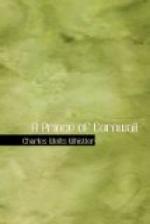And when in my dream I had seen this strange place, always I woke with the voice of Owen in my ears calling me. That was the thing which made me uneasy more than that a dream should come often.
Three times that dream and voice came to me, but I said nought of it to any man. Then one day into the courtyard of the king’s hall rode men in haste from the westward, and when I was called out to meet them the first man on whom my eyes rested was Jago of Norton, and my heart fell. Dusty and stained he was with riding, and his face was worn and hard, as with trouble, and he had no smile for me.
“What news, friend?” I said, coming close to him as he dismounted.
“As they took you, so have they taken Owen. We have lost him.”
“Is he slain?”
“We think not. He was wounded and borne away. We cannot trace him or his captors. Gerent needs you, and I have a letter to your king.”
I asked him no more at this time, but I took him straightway to Ina, travel stained as he was. He had but two men with him, and they were Saxons he had asked for from Herewald the ealdorman as he passed through Glastonbury in haste.
So Ina took the letter, and opened it, and as he read it his face grew troubled, so that my fear that I had not yet heard the worst grew on me. Then he handed it to me without a word.
“Gerent of the Britons, to Ina of Wessex.—I pray you send me Oswald, Owen’s foster son, for I need him sorely. On my head be it if a hair of him is harmed. He who bears this is Jago, whom you know, and he will tell my need and my loneliness. I pray you speed him whom I ask for.”
That was all written, and it seemed to me that more was not needed. One could read between the lines, after what Jago had said.
“What is the need for you?” Ina asked, as I gave him back the letter.
“To seek for Owen, my father,” I said. “Jago must tell what we have to hear.”
Then he told us, speaking in his own tongue, so that I had to translate for the king now and then, and it was a heavy tale he brought.
Owen had gone to some house that belonged to Tregoz, in the wild edge of Dartmoor north of Exeter, and there men unknown had set on the house and burnt it over him, slaying his men and sorely wounding himself. Only one man had escaped to tell the tale, and he was wounded and could tell little. And the deed was wrought in the night, and into the night he had seen the men depart, bearing the prince with them. But who and whence they were he could neither tell nor guess.
Then Gerent had ridden in all haste to the house, and found even as the wounded man had told, for all was still as the burners left it. But no man of all the village, nor the shepherds on the hills, could tell more. Owen was lost without trace left.
Then said Ina: “What more could be done by Oswald?—Will men help a Saxon?”
“This must be between ourselves, King Ina,” Jago said plainly. “It is in my mind that if Oswald and I or some known lord of the British will go to that place and sit there quietly with rewards in our hands, we may learn much; for men fear Gerent the king in his wrath, and they fled from his coming.”




